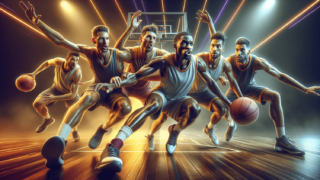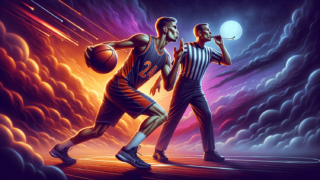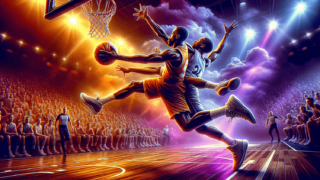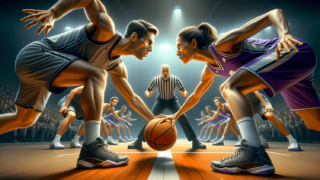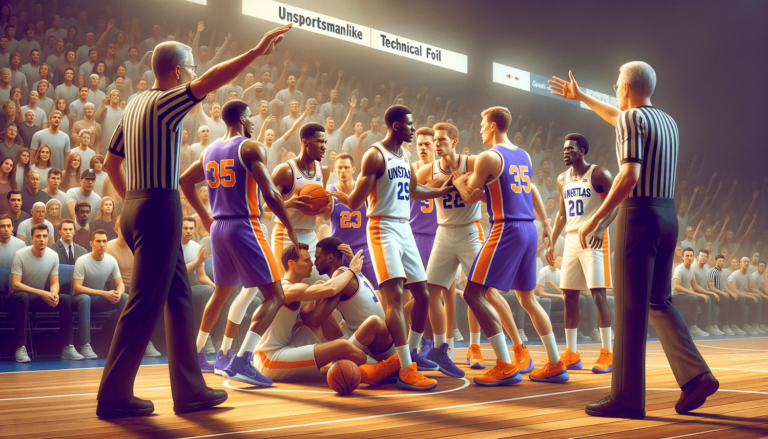
Unsportsmanlike Technical Foul Rule in Basketball
Written by: Basketball Universe
Last updated:

🏀 If you’re a true hoops enthusiast, you know that the game of basketball is not only about incredible shots and legendary dunks, but also about sportsmanship, mutual respect, and honor. In this intriguing blog post, we’ll dive into the world of the unsportsmanlike technical foul, a rule that ensures our beloved game remains not only exciting but also fair and respectful. So, tighten your sneakers, grab your reading glasses, and join us on an enlightening journey as we dissect this fascinating aspect of basketball! 🏀
Unsportsmanlike Technical Foul Rule in Basketball
The unsportsmanlike technical foul rule in basketball is designed to maintain a positive atmosphere and encourage fair play within the game. It’s called when a player or team personnel engages in behavior deemed disrespectful, unethical, or unsportsmanlike, such as arguing with officials, using offensive language, or taunting opponents. When this foul is assessed, the opposing team is awarded one or two free throws and possession of the ball, depending on the league’s specific rules. The goal is to discourage these actions and protect the integrity of the game.
A Deeper Dive into the Unsportsmanlike Technical Foul
Before we can delve into the unsportsmanlike technical foul rule in basketball, it’s important to understand the broader context of fouls in the game. In basketball, there are two main types of fouls: personal fouls and technical fouls. Personal fouls involve physical contact between players, such as pushing or holding, while technical fouls involve non-contact infractions, like unsportsmanlike conduct or disrespecting the referees. It’s worth noting that these two categories have distinct implications on the game, with technical fouls carrying stiffer penalties.
Unraveling the Official Basketball Rules
To demystify unsportsmanlike technical fouls, let’s take a closer look at some official basketball rules. Within the realm of technical fouls, there are two subcategories: administrative and unsportsmanlike. Administrative technical fouls pertain to procedural violations like illegal substitutions, whereas unsportsmanlike technical fouls are concerned with conduct and behavior. In this blog, we’ll focus on the latter, tackling everything from the root causes to the subsequent consequences.
Identifying Unsportsmanlike Technical Fouls
There’s a wide variety of actions that can lead to an unsportsmanlike technical foul. Observing these behaviors is crucial not only for officials but also for players who wish to avoid getting penalized. Here are some common causes of unsportsmanlike technical fouls:
Arguing with Referees
Disputing an official’s call or decision is strictly prohibited in basketball. While players and coaches may feel strongly about a particular call, it’s essential to respect the authority of referees and accept their decisions. Excessively arguing or showing dissent could result in an unsportsmanlike technical foul.
Using Offensive Language
Offensive language can take many forms, such as profanity, slurs, or derogatory comments. This type of behavior is unacceptable on the basketball court and can lead to an unsportsmanlike technical foul. The golden rule: if you don’t have something nice to say, don’t say it at all.
Taunting Opponents
While a little bit of gamesmanship and friendly banter can heighten excitement, disrespectful or demeaning gestures and remarks directed towards opponents have no place in basketball. Taunting can quickly escalate to an unsportsmanlike technical foul, tarnishing the game’s spirit.
Unnecessary Physical Contact
Though physical play is an integral part of basketball, unnecessary or excessive contact – like shoving, tripping, or retaliating against opponents – can result in an unsportsmanlike technical foul. Players must remember that their actions have consequences and must exercise caution when vying for position or battling for the ball.
Inappropriate Conduct by Team Personnel
Unsportsmanlike behavior doesn’t only apply to players; coaches, team staff, and even spectators can be slapped with unsportsmanlike technical fouls too. Any actions deemed disrespectful or inconsistent with good sportsmanship, like throwing objects onto the court, can trigger a foul call.
The Consequences of Unsportsmanlike Technical Fouls
Now that we’re familiar with the types of behavior that can lead to an unsportsmanlike technical foul, it’s important to understand the consequences associated with these violations.
Penalties
The typical penalty for an unsportsmanlike technical foul entails one or two free throws for the opposing team, followed by a change of possession. The exact number of free throws awarded varies depending on the specific league’s rules. In the NBA, for instance, the guilty team’s opponent receives one free throw, while in FIBA competitions, this foul merits two free throws.
Ejections and Suspensions
If a player or team personnel accumulates multiple unsportsmanlike technical fouls in a single game, they may face ejection. For example, the NBA enforces a rule whereby two technical fouls lead to ejection, while some leagues allow the officials to eject a player directly for a single flagrant unsportsmanlike act. Suspensions and fines can also be imposed depending on the severity of the incident and the offender’s track record with the league.
Impact on Team Morale and Performance
Beyond the tangible penalties, unsportsmanlike technical fouls can also have significant psychological impacts on the team. Negative behavior can disrupt team chemistry, dampen morale, and even adversely affect performance on the court. Players must keep their emotions in check and focus on the ultimate goal: winning the game.
Preventing Unsportsmanlike Technical Fouls
Whether you’re a player or a coach, being aware of the triggers for unsportsmanlike technical fouls is key to maintaining a positive and respectful atmosphere on and off the court. Here are some strategies to help prevent these fouls from happening:
Lead by Example
Coaches and team captains play a crucial role in establishing a respectful and sportsmanlike culture within the team. Demonstrating fair play, humility, and respect for opponents and referees can have a profound impact on the entire squad, preventing the likelihood of unsportsmanlike technical fouls.
Focus on Communication and Teamwork
Open and honest communication is the foundation of a cohesive team. Encouraging dialogue between players, coaches, and staff can help address frustrations and ensure any disagreements are resolved in a constructive manner – well before they escalate into unsportsmanlike conduct.
Develop Emotional Intelligence
High-pressure situations in basketball show just how critical emotional intelligence is for players. Developing the ability to manage emotions, maintain composure, and stay focused on the task at hand can significantly reduce instances of unsportsmanlike technical fouls.
Educate Players and Team Personnel
Education is a powerful tool in curbing unsportsmanlike behavior. Familiarizing everyone involved with the team about the rules, consequences, and potential penalties for unsportsmanlike technical fouls can help prevent their occurrence and create a respectful environment on the court.
Embracing the Spirit of Fair Play
In conclusion, while fierce competition is undeniably a part of basketball, it’s essential to embrace sportsmanship and camaraderie as integral elements of the game. Understanding the ins and outs of the unsportsmanlike technical foul rule is vital for players, coaches, and spectators alike, ensuring that everyone can appreciate and enjoy the fabulous game of basketball to the fullest.
Importance of Sportsmanship in Basketball
Sportsmanship, which encompasses fair play, respect, and a positive attitude, is an essential aspect of basketball. Upholding and emphasizing the importance of sportsmanship can create a more enjoyable atmosphere for players, coaches, and spectators alike. By promoting respect and understanding, teams and individuals can foster strong relationships that pave the way for success on and off the court.
Role of Referees in Enforcing Sportsmanship
Referees play a crucial role in preserving sportsmanship by enforcing basketball rules, ensuring fair play, and penalizing unsportsmanlike conduct. In order to uphold the integrity of the game, referees must carefully monitor and assess players’ and team personnel’s behavior, making impartial decisions that reinforce the values of respect, fairness, and good sportsmanship.
Consistency in Officiating
Consistency is a key aspect of refereeing, as it ensures that all teams and players are treated equally by the officials. Referees must be well-versed in basketball rules and work diligently to apply these rules uniformly, regardless of individual players or particular teams. It’s essential that referees remain objective and impartial, bearing in mind that their priority is to protect the spirit and essence of basketball.
Respect for Officials
Just as referees have a duty to enforce sportsmanship, players, coaches, and everyone involved in the game bear a responsibility to respect the officials and their decisions. Despite the potential frustration arising from crucial calls, it is crucial to acknowledge referees’ expertise and objective perspective. Demonstrating courtesy and an understanding of their role within the game will not only enhance the overall sportsmanship, but also improve the atmosphere of the sport.
Encouraging Positive Behavior Among Fans and Spectators
Fans and spectators, like players and team personnel, significantly impact the overall sporting environment. By promoting positive behavior in the stands, such as cheering on one’s team without disparaging the opposing side, supporters can contribute to a more welcoming and enjoyable basketball experience for everyone involved.
Basketball Organizations and Fan Engagement
Basketball organizations play a vital part in cultivating a constructive atmosphere in the sport. By promoting sportsmanship, educating fans, and engaging with stakeholders, organizations can encourage positive behavior and reduce instances of unsportsmanlike conduct. Through initiatives like community outreach and public campaigns, basketball organizations can contribute to fostering mutual respect and enjoyment of the game.
Final Thoughts
Unsportsmanlike technical fouls not only affect the outcome of a game but also impinge upon the spirit of basketball. By understanding the rules and consequences related to unsportsmanlike conduct and promoting good sportsmanship, everyone involved in the sport can contribute to creating a positive and inspiring atmosphere. The appreciation of sportsmanship enhances the enjoyment of basketball for all fans, players, and coaches, strengthening the bonds that make this game truly remarkable. Together, we can ensure that basketball remains a much-loved and celebrated sport globally.
Frequently Asked Questions
You may have questions about the unsportsmanlike technical foul rule in basketball, and we’re here to help! In this FAQ section, we’ve compiled some of the most commonly asked questions and concise answers to provide you with valuable insight into this topic. Read on to discover more!
1. What is the difference between a technical foul and an unsportsmanlike technical foul?
A technical foul refers to non-contact infractions that violate basketball rules, such as illegal substitutions or delay of game. An unsportsmanlike technical foul, on the other hand, involves conduct-related violations, such as arguing with referees, using offensive language, or taunting opponents.
2. How many free throws are awarded for an unsportsmanlike technical foul?
The number of free throws awarded for an unsportsmanlike technical foul depends on the specific league rules. In the NBA, the opposing team gets one free throw, whereas in FIBA competitions, an unsportsmanlike technical foul grants the opposing team two free throws.
3. Can a player be ejected for unsportsmanlike technical fouls?
Yes, a player can be ejected for accumulating multiple unsportsmanlike technical fouls in a single game. In the NBA, two technical fouls result in automatic ejection, while some leagues may allow officials to eject a player directly for a single flagrant unsportsmanlike act.
4. Can unsportsmanlike conduct result in suspensions and fines?
Absolutely. Suspensions and fines can be imposed on players or team personnel depending on the severity of the unsportsmanlike conduct and their track record with the league. For major infractions, league officials may choose to enforce stricter punishments.
5. Are team personnel, such as coaches or staff members, subject to unsportsmanlike technical fouls?
Yes, team personnel, including coaches, staff, and even spectators, can be called for unsportsmanlike technical fouls if they engage in actions that are disrespectful, unethical, or detrimental to good sportsmanship.
6. How do I know if an action constitutes an unsportsmanlike technical foul?
In general, any behavior that disrespects opponents, officials, or the game itself can be considered an unsportsmanlike technical foul. This can range from arguing with referees to using offensive language, taunting, or engaging in unnecessary physical contact.
7. How can players prevent getting unsportsmanlike technical fouls?
Players can avoid unsportsmanlike technical fouls by exhibiting good sportsmanship, focusing on communication and teamwork, developing emotional intelligence, and respecting the authority of referees and the rules of the game.
8. Is there any situation where unsportsmanlike conduct may not result in a technical foul?
While referees have some discretion when it comes to calling fouls, actions that clearly display unsportsmanlike conduct are generally penalized with a technical foul. However, in some borderline cases, referees may decide to issue a warning before assessing a technical foul.
9. How does an unsportsmanlike technical foul impact the course of a game?
An unsportsmanlike technical foul can have significant consequences on the outcome of a game. The opposing team is awarded one or two free throws (depending on league rules), and a change of possession occurs, which can ultimately affect the scoring dynamics of the game.
10. Why is sportsmanship so important in basketball?
Sportsmanship, which incorporates fair play, respect, and a positive attitude, contributes to creating an enjoyable atmosphere for everyone involved in the sport. By adhering to good sportsmanship, players, coaches, and spectators can foster strong relationships and a shared love for the game of basketball.
Featured Posts
- No pillar pages found.
